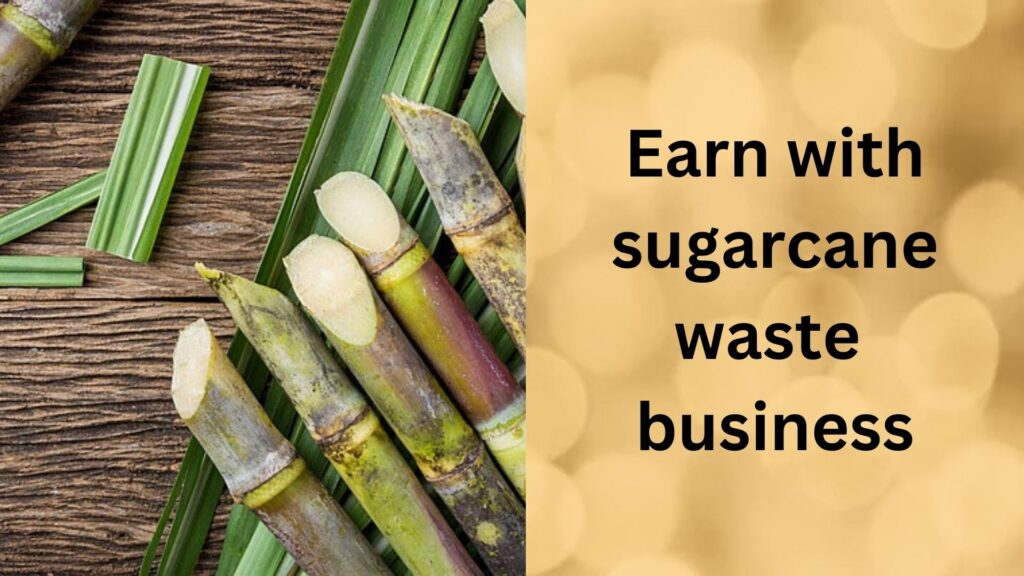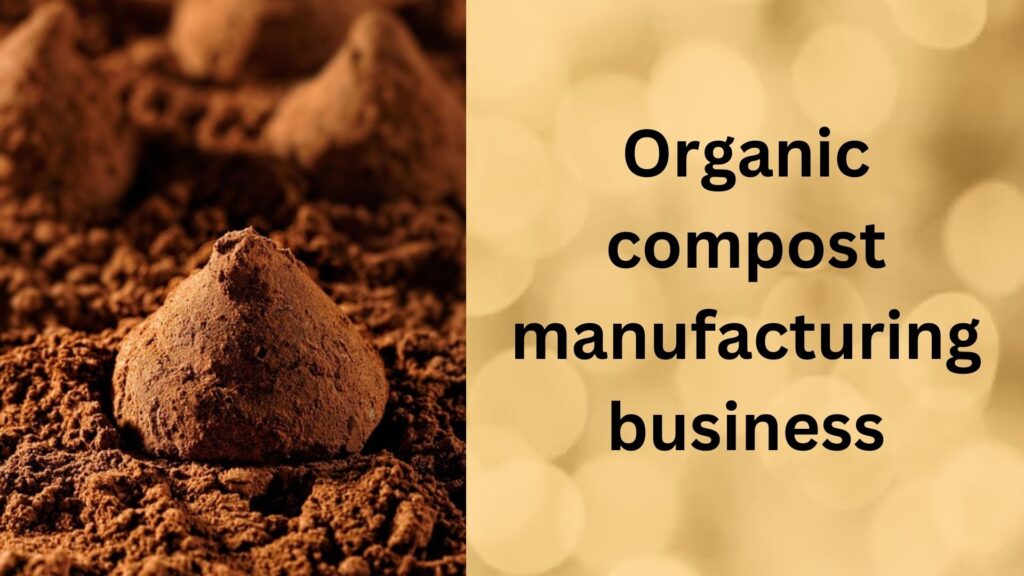Table of Contents
Agro waste and fertilisers business as sugarcane Waste business :

Agro waste and fertilisers business as sugarcane waste, also known as bagasse, is the fibrous residue left after juice extraction from sugarcane. Other byproducts include sugarcane leaves, molasses, and press mud. Instead of being discarded, sugarcane waste can be recycled into valuable products, offering multiple business opportunities.
Industrial & Commercial Products:
- Biofuels & Biogas – Bagasse is used to produce ethanol, bioethanol, and biogas.
- Paper & Pulp – Bagasse-based paper is an eco-friendly alternative to wood-based paper.
- Animal Feed – Processed bagasse and molasses are used in cattle feed.
- Compost & Organic Fertilizer – Press mud is converted into compost.
- Disposable Tableware – Plates, bowls, and cups made from sugarcane bagasse.
- Eco-friendly Packaging – Sustainable packaging materials for food and e-commerce.
- Bioplastics – Used to manufacture biodegradable plastic alternatives.
- Textile Fiber – Bagasse fiber can be blended into fabrics.
Home-Based Products Made from Sugarcane Waste
- Handmade Paper & Stationery – Notebooks, envelopes, and greeting cards.
- Eco-friendly Craft Items – Decorative pieces, lamps, and jewelry.
- Organic Compost – For home gardening.
- Biofuel Briquettes – Compressed bagasse briquettes for home cooking and heating.
- Candles & Soaps – Molasses-based candles and skincare products.
- Disposable Plates & Cups – Made using simple molding machines.
Machinery Required for Sugarcane Waste Processing
- Pulverizing Machine – Converts bagasse into fine fibers for paper or tableware.
- Paper Making Machine – For producing bagasse-based paper.
- Molding Machine – For disposable plates, bowls, and cups.
- Briquette Press Machine – Converts bagasse into fuel briquettes.
- Bio-digester – Produces biogas from sugarcane waste.
- Shredding & Drying Units – Prepares waste for further processing.
Market Potential:
- India’s ethanol market is booming due to government policies.
- Rising demand for eco-friendly paper and packaging.
- Growing interest in organic farming and composting.
Investment & Profitability:
- Depends on land price, machinery cost.
Potential Income:
- Profit Margins – 30-70%, depending on the product and market.
- Small-scale businesses can earn ₹50,000 – ₹2,00,000 per month.
Government Support & Subsidies
- National Bio-Energy Mission – Support for biofuel production.
- PMEGP (Prime Minister’s Employment Generation Programme) – Funding for small businesses.
- MSME & Mudra Loans – For setting up eco-friendly production units.
- Subsidies for Waste-to-Wealth Initiatives – Government incentives for recycling businesses.
Organic Compost manufacturing business:

Organic compost is a natural soil conditioner made from decomposed plant and animal matter, such as vegetable scraps, manure, leaves, and biodegradable waste. It is rich in nutrients and improves soil health, making it an eco-friendly alternative to chemical fertilizers.
Business Opportunities in Organic Compost Production
- Organic Farms & Agribusinesses – Used in fruit, vegetable, and grain cultivation.
- Government & Municipal Bodies – Composting initiatives for waste management.
- Gardeners & Landscapers – High demand in nurseries, parks, and landscaping businesses.
- Retail & E-commerce – Selling branded compost in bags (10kg, 25kg, 50kg) online and in stores.
- Export Market – High demand in countries promoting organic farming, like Europe, USA, and UAE.
Machinery Required for Organic Compost Production
- Shredding Machine – Cuts organic waste into smaller pieces for faster decomposition.
- Composting Machine (Bio-digester) – Speeds up the breakdown of organic matter.
- Sieving Machine – Separates fine compost from larger debris.
- Packaging Machine – For bagging compost into sellable units.
- Aeration System – Ensures proper oxygen supply to compost piles.
- Waste Collection & Storage Area – Space for raw organic waste and processing.
Investment & Profitability:
Depends upon land cost and machinery and approximately above 2-3 lacs.
Potential Income:
- Profit Margins – 30-60%, depending on sourcing, production efficiency, and market.
- Small-scale businesses can earn ₹50,000 – ₹2,00,000 per month.
Government Support & Subsidies
- PM Formalization of Micro Food Processing Enterprises (PMFME) Scheme – Grants & financial aid.
- Subsidies for Organic Farming & Composting Units – Offered by NABARD, MoFPI, and State Agriculture Departments.
- Loans under MSME & Mudra Yojana – For setting up composting plants.
- Municipal & Urban Waste Management Funds – Support for composting initiatives.
Banana fiber manufacturing business:

Banana fiber manufacturing business in India is a sustainable and profitable opportunity, especially as demand grows for eco-friendly alternatives in textiles, handicrafts, paper, and packaging industries.
Business Overview:
Banana fiber is extracted from the pseudostem of banana plants (which is usually discarded after harvesting). It’s strong, biodegradable, and ideal for textiles, ropes, mats, paper, and composites.
Products You Can Manufacture:
- Raw banana fiber (B2B supply)
- Textiles & fabrics (eco-fashion, home decor)
- Handicrafts: Bags, mats, ropes, baskets
- Sanitary pads
- Pulp & paper products
- Composites: Bioplastics, automotive interiors
- Thread/yarn: For weaving or knitting
- Agri mulch or geotextiles: For farming and erosion control
- Fertilizers
Business Potential in India:
- High availability: India is a major banana producer (Tamil Nadu, Maharashtra, Gujarat, Kerala, Assam).
- Eco-friendly appeal: Rising interest in sustainable and biodegradable materials.
- Growing global demand: Especially in the textile, paper, and handicrafts export markets.
- Supportive policies: Startups in this domain can benefit from government schemes under MSME, KVIC, or Atma Nirbhar Bharat.
Investment Required:
5-7 lacs.
Infrastructure Needed:
- Location: Near banana farms (for easy raw material sourcing)
- Machinery:
- Fiber extraction machine (manual/semi-auto/fully auto)
- Cleaning, drying, and combing tools
- Yarn spinning (if value addition)
- Shed: For processing, drying, storage
- Water supply: Required for washing and softening fiber
- Packaging and shipping area
- Transportation: Small trucks for collecting stems and delivering fiber
Revenue & Profitability:
Profit depends on whether you sell raw fiber or finished goods.
Marketing & Sales Channels:
- Sell raw fiber to:
- Textile mills
- Handicraft cooperatives
- Paper manufacturers
- Sell finished products through:
- Handloom exhibitions, Dilli Haat, online marketplaces (Amazon, Etsy)
- B2B buyers (exporters, eco-brands)
- Tie-ups with NGOs or self-help groups